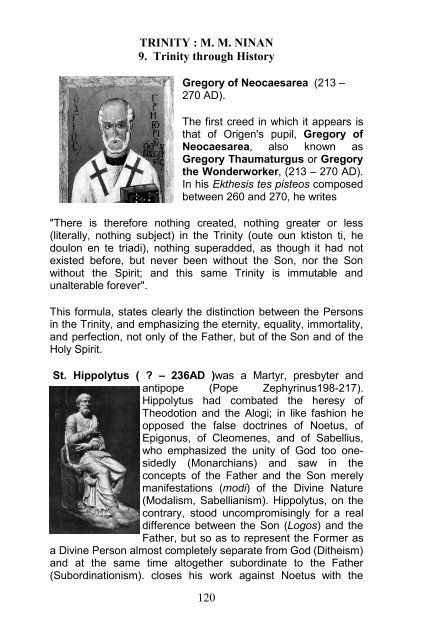Christian Understanding of Trinity3
Create successful ePaper yourself
Turn your PDF publications into a flip-book with our unique Google optimized e-Paper software.
TRINITY : M. M. NINAN<br />
9. Trinity through History<br />
Gregory <strong>of</strong> Neocaesarea (213 –<br />
270 AD).<br />
The first creed in which it appears is<br />
that <strong>of</strong> Origen's pupil, Gregory <strong>of</strong><br />
Neocaesarea, also known as<br />
Gregory Thaumaturgus or Gregory<br />
the Wonderworker, (213 – 270 AD).<br />
In his Ekthesis tes pisteos composed<br />
between 260 and 270, he writes<br />
"There is therefore nothing created, nothing greater or less<br />
(literally, nothing subject) in the Trinity (oute oun ktiston ti, he<br />
doulon en te triadi), nothing superadded, as though it had not<br />
existed before, but never been without the Son, nor the Son<br />
without the Spirit; and this same Trinity is immutable and<br />
unalterable forever".<br />
This formula, states clearly the distinction between the Persons<br />
in the Trinity, and emphasizing the eternity, equality, immortality,<br />
and perfection, not only <strong>of</strong> the Father, but <strong>of</strong> the Son and <strong>of</strong> the<br />
Holy Spirit.<br />
St. Hippolytus ( ? – 236AD )was a Martyr, presbyter and<br />
antipope (Pope Zephyrinus198-217).<br />
Hippolytus had combated the heresy <strong>of</strong><br />
Theodotion and the Alogi; in like fashion he<br />
opposed the false doctrines <strong>of</strong> Noetus, <strong>of</strong><br />
Epigonus, <strong>of</strong> Cleomenes, and <strong>of</strong> Sabellius,<br />
who emphasized the unity <strong>of</strong> God too onesidedly<br />
(Monarchians) and saw in the<br />
concepts <strong>of</strong> the Father and the Son merely<br />
manifestations (modi) <strong>of</strong> the Divine Nature<br />
(Modalism, Sabellianism). Hippolytus, on the<br />
contrary, stood uncompromisingly for a real<br />
difference between the Son (Logos) and the<br />
Father, but so as to represent the Former as<br />
a Divine Person almost completely separate from God (Ditheism)<br />
and at the same time altogether subordinate to the Father<br />
(Subordinationism). closes his work against Noetus with the<br />
120


















